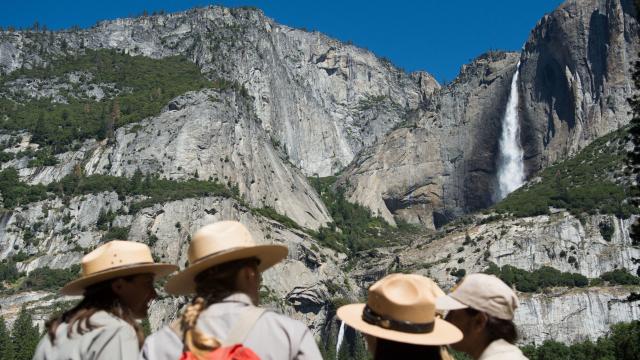President Donald Trump has been determined to build his forsaken border wall between the U.S. and Mexico. Why? To keep Central American migrants out.
But part of his plan to make sure of that has also involved taking park rangers out of U.S. national parks and into the borderlands near Mexico. The administration began reassigning law enforcement rangers to border parks in 2018 and now will extend the program into the end of next year. This type of action not only threatens the public lands these park rangers were hired to protect; it also threatens the Department of Interior’s efforts to help diversify visitors to national parks and other lands. Making park rangers, in essence, border patrol officers erodes the trust the agency has attempted to build with immigrant communities”especially Latinx families.
[referenced url=” thumb=” title=” excerpt=”]
This isn’t surprising coming from the Trump administration. This is the same administration that is using public lands within the Organ Pipe Cactus National Monument to construct an ugly arse wall along the border in Arizona. In doing so, contractors have bulldozed saguaro cacti, destroyed a precious desert ecosystem, and put archeological sites at-risk. The president has had little luck securing the funding he needs to implement his plan through Congress, so he’s making do with what he’s got through a national emergency declaration.
His efforts have also led to moving federal resources within the Department of Interior under which the National Park Service sits, including law enforcement rangers. USA Today has reported that park rangers are heading to Arizona and Texas from the Great Smoky Mountains National Park in Tennessee, Wrangell-Saint Elias National Park in Alaska, Zion National Park in Utah, and the National Mall. Great Smoky Mountains is the busiest park in the entire system.
“That’s not what park rangers signed up for,” Aaron Weiss, the deputy director of the Centre for Western Priorities, told Earther. “That’s not why we trust park rangers. So it does send a dangerous and confusing message even for the rangers who aren’t being sent to the border.”
The National Park wouldn’t share any details with Earther on how many rangers have been deployed to the border, whether they have the option to refuse this work, or how the service is protecting natural resources in parks that rangers are being removed from. Instead, the National Park Service sent the same copy-and-paste statement it’s sent other outlets.
“The National Park Service continues to support our federal partners by deploying law enforcement personnel to Department of the Interior managed lands along the southern border,” an unnamed spokesperson wrote in an email. “Due to operational security, we will not be disclosing any additional information about our officers assisting in the operations.”
artifacts from grave robbers. They also help protect the law-abiding visitors who may get lost on a trail or suffer an injury. Reassigning rangers, including from the busiest park in the country, puts parks and people at risk.
But it also puts a particular burden on visitors who may be immigrants. Or children of immigrants. Hell, even fourth-generation Latinx who are as American as they come may feel a bit differently when they visit parks now as they contend with the weight of U.S. immigration policy.
This type of policy won’t help the lack of Hispanic visitors to the national park system who were more likely to report than other racial groups that they see park service units as “unsafe,” according to a 2011 National Park Service report. Indeed, Hispanic visitors were less likely than white or black people to “talk informally with a park ranger.” Asking park rangers to act like border patrol officers won’t improve this situation.
“It’s going to be a step back, and it’s going to reinforce some comments and some distrust that the Latino community, in specific, has with the National Park Service and with park service rangers,” Jessica Loya, national policy director for GreenLatinos, told Earther.
Plus, park rangers aren’t necessarily trained on human rights. Having them work as some kind of extension of Border Patrol creates unsafe conditions not only for them but also for any migrants that rangers might come across while they’re on patrol.
